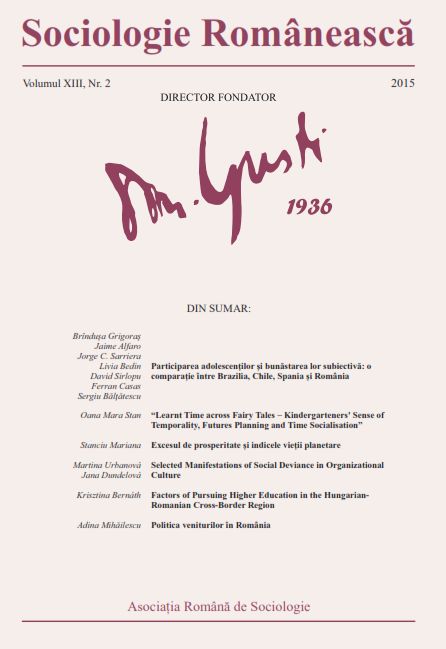Participarea adolescenţilor şi bunăstarea lor subiectivă: o comparaţie între Brazilia, Chile, Spania şi România
Adolescent’s Participation and their Subjective Well-Being: a Comparison between Brazil, Chile, Spain and Romania
Author(s): Brînduşa‑Antonia Grigoraş, Jaime Alfaro, Jorge C. Sarriera, Livia Bedin, David Sirlopu, Ferran Casas, Sergiu BălţătescuSubject(s): Sociology
Published by: Editura Eikon
Keywords: adolescents; participation in life contexts; subjective well-being; cross-country research; gender
Summary/Abstract: Adolescents’ participation in all the matters that affect them has great importance for their life and well-being. Just a few studies explore adolescents’ social participation and even less address the link between adolescents’ participation and their subjective well-being (SWB). This article explores adolescents’ perceptions on their participation in family, school, and community and its’ relationship with their SWB measured by four psychometric scales: OLS, SLSS5, BMSLSS and PWI-SC5. Data have been collected within International Survey of Children’s Well-Being-ISCWeB (the first international extended pilot 2011-2012) from four samples of adolescents (M=12,1, SD=0,68): Brazil, Chile, Romania and Spain. Descriptive and exploratory analyzes were performed using independent sample ‘t’ test in order to examine mean scores of the SWB indicators by gender in the four countries and Pearson Chi-Square to test gender differences between the group of adolescents who perceive they are listened by adults and the group with nonparticipation. The relationship between adolescents’ perception on participation in family, school and community, gender and their SWB was explored by analysis of variance (ANOVA). The results indicated that greater perceived participation of adolescents aged 12 is significantly associated with higher subjective well-being. Variations between countries in SWB in the way that adolescent’s perceive their participation and also between boys and girls were found. The results are discussed with focus on the implementation of children’s rights and programs which enables adolescents’ participation in the contexts of their life and also on the need to improve policies for children and adolescents.
Journal: Sociologie Românească
- Issue Year: 13/2015
- Issue No: 02
- Page Range: 5-27
- Page Count: 23
- Language: Romanian

